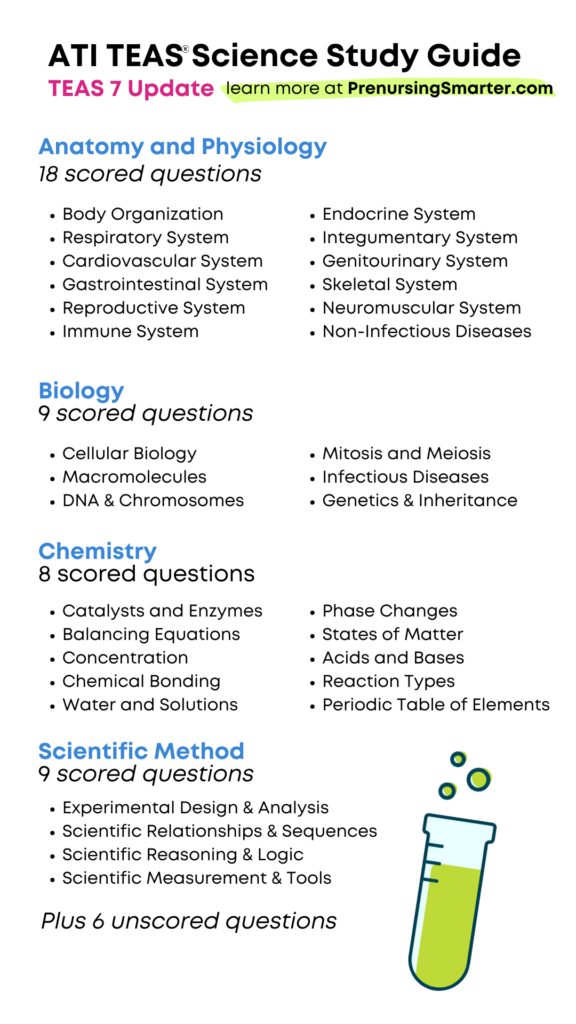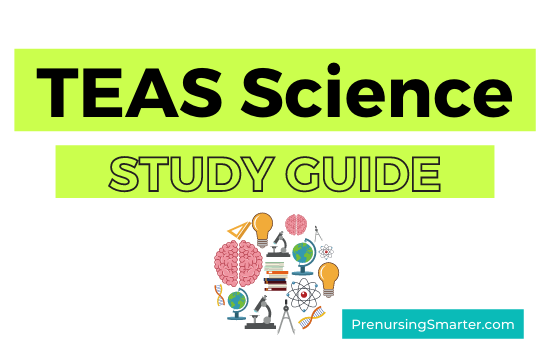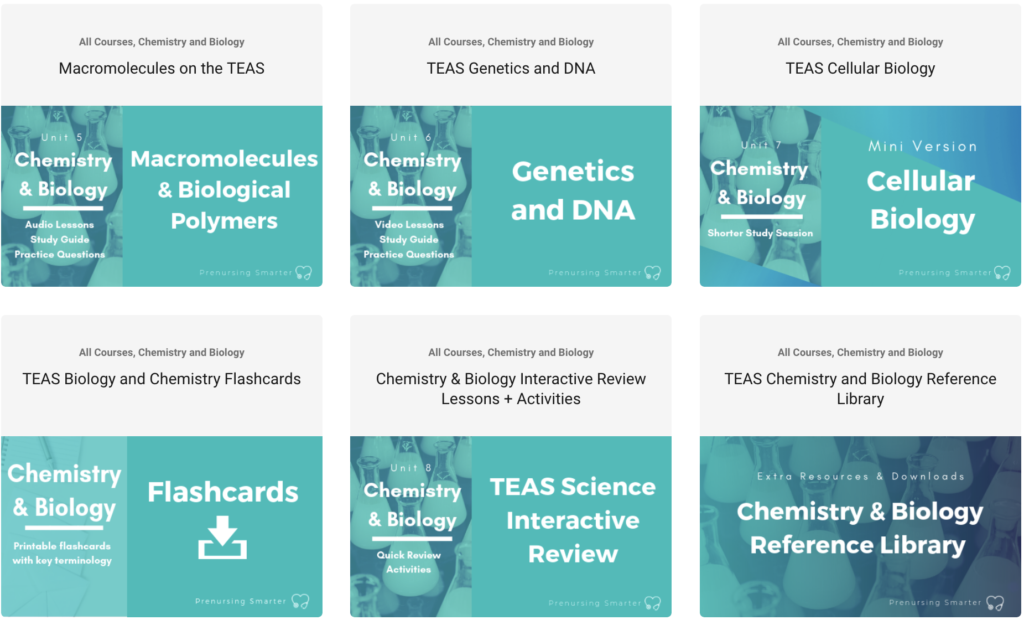Does the ATI TEAS science section have you feeling overwhelmed? This is normal! TEAS science covers SO much material. Let’s go over some TEAS science review specifics.
TEAS 7 Science = 44 scored questions + 6 unscored questions
- Anatomy and Physiology Scored Questions = 18
- Biology Scored Questions = 9
- Chemistry Scored Questions = 8
- Scientific Method Scored Questions = 9
On the TEAS 7 Science section, you’ll have 50 total questions.
As you can see, you’ll have the most TEAS test science questions on anatomy and physiology. These questions will cover the body’s organ systems. You’ll need to know specifics about each system, how they interact with each other, and general pathology.
Are you taking the ATI TEAS soon? Learn about the ATI TEAS 7.

What’s on the TEAS test science section?
The TEAS 7 Science section still covers 4 main topic areas, but it reduces the number of anatomy and physiology questions while increasing biology and chemistry questions.
Try ATI TEAS Science practice questions:
⬇️ Updated for the TEAS 7. ⬇️
Take more TEAS Practice Science Questions here.
You’ll be tested the most on Anatomy and Physiology for the entire exam. It’s the single most-tested concept.
On the TEAS 7 Science section, you’ll have 60 minutes to answer a total of 50 TEAS test science questions. This means you have a little more than a minute to answer each question. And that means you really need to know exactly what you should study for the TEAS science test so you can use your test time wisely!
TEAS Science Study Guide – What to cover
When creating your TEAS 7 science study guide, you want to make sure your resources cover the types of questions. For example, you’ll have almost twice as many anatomy and physiology questions as you well chemistry or biology, so make sure you TEAS science study guide focuses on all human body systems.
This is exactly what you’ll need to study for your TEAS science review:
Anatomy and Physiology TEAS Science Topics (18 scored questions)
- Body Basics & Organization – Cavities and Planes
- Cells, Tissues, and Organs in the Human Body
- Respiratory System – Structures and Functions
- Cardiovascular System – Circulation, Cells, & Pathology
- Gastrointestinal System – Structures, Hormones, and Enzymes, Digestion & Absorption
- Reproductive System – Structures, Hormones, and Key Differences
- Endocrine System – Organs, Hormones & Communication
- Immune System – Cells and Types of Immunity
- Integumentary System – Skin Layers and Functions
- Genitourinary System – Kidney Anatomy and Urine Production
- Skeletal System – Cells, Bones, & Structures
- Neuromuscular System – Nerves, Muscles, and Signaling
- Non-Infectious Disease
Biology TEAS Science Topics (9 scored questions)
- Cellular Biology – Organelles and Differentiation
- Mitosis and Meiosis
- Infectious Diseases
- Macromolecules
- DNA & Chromosomes
- Genetics & Inheritance
Chemistry TEAS Science Topics (9 scored questions)
- Phase Changes
- States of Matter
- Chemical Bonds
- Acids and Bases
- Catalysts and Enzymes
- Periodic Table of Elements
- Water and Solutions
- Reaction Types
- Concentration
Scientific Method TEAS Science Topics (9 scored questions)
- Scientific Measurement & Tools
- Scientific Relationships & Sequences
- Scientific Reasoning & Logic
- Scientific Measurement & Tools
- Experimental Design & Analysis
The TEAS follows a standardized scoring structure, and the scored questions all follow this standardized blueprint.
How to structure your TEAS science review
For ATI TEAS science prep, there’s a bit of good news and bad news.
Bad News → The TEAS has a TON of science questions that are fair game.
What does this mean? On the TEAS science section, you could see a question about ionic bonds and the periodic table, zygote formation and cell differentiation, endocrine system dysfunctions, acid-base reactions, and specific cells in the epidermis.
It’s like taking your chemistry final, your biology final, and your anatomy and physiology final all at once. Yikes!
You could get lost in what you might be tested on the TEAS. Odds are, you’ll waste time, feel overwhelmed, and start doubting yourself. No thanks.
But there’s good news!
Good News → The TEAS emphasizes specific scientific concepts.
If you use a TEAS science study guide to help you master these concepts first, you can forget worrying about the rest. In fact, if you focus on what’s emphasized, it’s possible to boost your score quite a bit… while reducing the overall number topics you actually need to study!
A prioritized framework for studying for the TEAS Science test means that you can breeze through specific questions, which gives you more time for the harder ones.
So what should you study first? For your TEAS science review, start with Anatomy and Physiology. If you need help picking a body system, start with the cardiovascular system, then tackle the respiratory system. The endocrine and immune systems are some of the most challenging, so you officially have my permission to study these last.
Then, review biology and chemistry. Understand the structure of the periodic table of elements and how macromolecules are used in the body. These are two great topics to tackle right away.
Next, focus on the scientific method and what makes a great experimental design.
I hope this helps you get started studying for the TEAS science test. If you are confident with these areas, you will be on your way to a passing score. If you need a good score, you’ll need to keep going.
ATI TEAS Science FAQ
This portion of the exam is 50 total questions. You’ll have 60 minutes, so you have just more than a minute per question to answer all of the questions.
A passing ATI TEAS science score usually means getting about 70 percent of the questions correct. In order to reach the 90th percentile nationwide, you’ll need to get more than 80-85 percent of the questions correct.
Nope! Some TEAS Science study guides include potential and kinetic energy questions, but these are not scored concepts.
Nope! Some out-of-date TEAS science review guides include earth science questions, but these are not scored concepts of the exam.
Yes! First, it’s normal to be nervous, so don’t beat yourself up. Second, recognize that you’ll likely only have about 2 scored questions on this. Don’t let 2 questions destroy your confidence. Focus on base pairing rules for RNA and DNA, how DNA is read (5’ to 3’), and ratios for Mendelian and Non-Mendelian inheritance. Put these on flashcards to memorize.
You will have scored questions that cover trends of the periodic table, ionic and covalent bonding, differences with acids and bases, and the properties of water. For biology, you will have scored questions on macromolecules, genetics and DNA, organelles, microbiology (infectious diseases), and mitosis and meiosis.
How to study for TEAS 7 Science
The #1 study method I recommend to all my students: focus on the most-emphasized concepts first—and then build up your studying to the other concepts.
That might sound obvious, like, “know what you need to know,” but the simple fact is that most students don’t actually know what it is they need to know! A solid TEAS Science study guide paired with a TEAS science practice test can help you figure out what you actually need to know.
If you are confident in the High-Value Concepts, you’ll be able to dive deeper into the details (and stay relaxed) simply because you know that you’ve got the most important TEAS study points in the bag.
When it comes to what to study for ATI TEAS science, focus on the High-Value Concepts–the questions you are most likely to be tested on–first. This means starting with Anatomy and Physiology. Prioritize anatomy and physiology to set yourself up for success on test day!
Then, study the material that you might see.
If you want a very high score, you’ll need to be prepared for the curve balls. Remember, the bad news is that the TEAS has a huge bank of concepts that are all fair game.
Yet mastering these High-Value Concepts will absolutely give you a leg up over the average TEAS taker.
TEAS Science Online Prep
In my online TEAS prep course, I help you walk you through every high-value concept you’ll need to know. You’ll get more comfortable with the High-Value Concepts so that you can prioritize your studying for the TEAS science test.
Students who use Prenursing Smarter for their TEAS science review increase their science assessment scores by an average of 17 points.
Plus, you’ll get audio review lessons and downloadable TEAS science study guide workbooks so that all the material sticks for test day.
Here’s what Prenursing Smarter student Alex said about the TEAS Science Prep: “Just wanted to say thank you for taking the time to make your TEAS course. I haven’t taken Anatomy or Physio yet, and Math/Bio/Chem haven’t been used in like 10 years. But I just got home from my first test attempt and managed an 82.3%. I’ll be submitting my application to a Nursing program this fall 🙂 The structure and information provided in your course was honestly so helpful.”
Ready to study smarter? Enroll in Prenursing Smarter today.

Kate is a CRLA certified tutor and test prep expert. She founded Prenursing Smarter in 2017. Kate lives in sunny Southern California and is an enrolled member of the Cheyenne River Sioux Tribe (Mnikȟówožu Lakȟóta). Prenursing Smarter is an inclusive business and actively seeks opportunities to collaborate with and support diverse voices.




